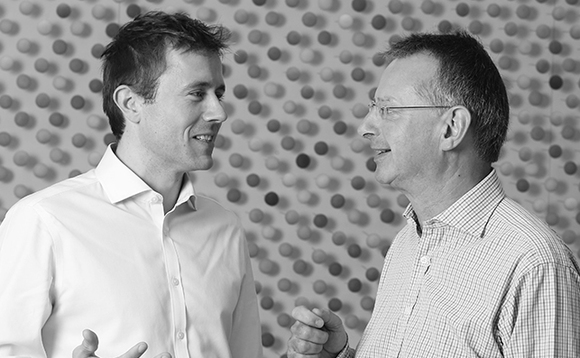
New GP Frost Brooks on importance of personal contribution

New firm Frost Brooks was established by former LDC investment manager Miles Frost (pictured left) – the son of the late Sir David Frost – and Peter Brooks (pictured right), previously managing director of LDC's London team. Frost speaks to unquote” about setting up shop in the current environment
Alice Murray: In a relatively short timeframe you invested in Parcel Monkey and BizEquity in July and in the beginning of October respectively. However, you set the firm up in 2012 – was this a case of being extremely selective?
Miles Frost: There was a very long gestation period for finding, negotiating and finalising dealflow, which led to two investments relatively soon after each other.
The primary reason behind this was cultivation of relationships, which led to both transactions, and, as you say, being selective. Not having a budget of capital to deploy or deals to do each year is fairly rare – and I see it as a great strength of our model. We intend to make the most of it and wait for the right deals.
AM: Frost Brooks has not raised a fund and is instead investing on a deal-by-deal basis. Why did you decide to use this strategy and how does it work in practice?
MF: We are fortunate in that we have close relationships with a few high-calibre family offices and high-net-worth individuals, who make up our LPs. When you invest your own capital in each transaction and supplement that with a few deep-pocketed investors, the need for a fund is less acute.
We can move fast if needed, and have done so – we completed our investment in BizEquity in nine weeks. But the nature of how we meet businesses, get to know them and partner with them means there is little need for four-week deal processes. No business worth backing that I've met is fussed if a deal completion is four weeks or nine weeks – they want the right partner, not a rapid cash dump. This is a relationship they will be in for many years – it needs to be right.
AM: One increasingly important theme in today's market is GP commitments. Why is it so important that you are personally contributing to these investments?
MF: Every business we look at seriously as a possible investment begins with that question: 'Do Peter and I want to put our own money into this?' And then we invest, not in a diverse fund, but directly in that business.
AM: You are targeting deals in the £1-10m range. Do you see a gap in the market here compared to the mid-market?
MF: I do. I think this is partly driven by the need for traditional PE investors to make money on fees. If you're targeting fees, your deal size creeps up as you chase larger denominators. If you're focused on the multiple of your own capital, it's one simple priority – the quality of the investment pound for pound.
AM: What is your main approach to origination?
MF: I'm afraid it's a clichéd and age-old answer: relationships. We know the sectors and business characteristics we like and we want to get to know the best people in those areas. Ultimately we like sectors where we and our LPs can add real value post-investment so that tends to drive origination too.
AM: Are you targeting any specific sectors?
MF: We are, though I don't want to give the game away completely!
Latest News
Stonehage Fleming raises USD 130m for largest fund to date, eyes 2024 programme
Multi-family office has seen strong appetite, with investor base growing since 2016 to more than 90 family offices, Meiping Yap told Unquote
Permira to take Ergomed private for GBP 703m
Sponsor deploys Permira VIII to ride new wave of take-privates; Blackstone commits GBP 200m in financing for UK-based CRO
Partners Group to release IMs for Civica sale in mid-September
Sponsor acquired the public software group in July 2017 via the same-year vintage Partners Group Global Value 2017
Change of mind: Sponsors take to de-listing their own assets
EQT and Cinven seen as bellweather for funds to reassess options for listed assets trading underwater








